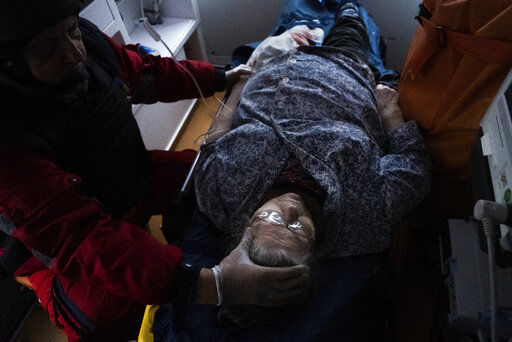
By Patrick J. McDonnell and Jaweed Kaleem
Los Angeles Times (TNS)
LVIV, Ukraine — As the besieged city of Mariupol rejected a demand to surrender, Russian forces mounted attacks across Ukraine overnight and into Monday, including a missile strike that officials said hit a Kyiv shopping center and killed at least eight people.
With fears growing that Moscow’s invasion of Ukraine is turning into a bloody war of attrition, Mariupol leaders rebuffed the Russian proposal — which offered evacuation routes for Ukrainian troops if they left by Monday morning — even after the reported bombing of a local art school where officials said hundreds of people had taken shelter.
Mariupol’s mayor swiftly ruled out giving in to the enemy troops that have surrounded his city, which has become a symbol of Ukrainian suffering and destruction. Deputy Prime Minister Iryna Vereshchuk also dismissed the Russian demand.
“There can be no talk of any surrender, laying down of arms,” she told the Ukrainian Pravda news organization.
In an overnight address, President Volodymyr Zelenskyy said the bombing of the art school, where he said 400 people had taken refuge, was further proof against Russian claims that it’s not targeting civilians.
“There were no military positions,” Zelenskyy said. “They are under the debris. We do not know how many are alive at the moment.”
The bombing, in a war-torn city where few journalists are present and internet connections have become scant, could not be independently verified. Ukraine officials have also accused Russians of forcing thousands of Mariupol residents to be deported to Russia. The allegation has also not been independently confirmed.
Nearly a month after the Feb. 24 invasion of Ukraine began, more than 3.3 million people — about 1 in 13 — have fled the nation, according to the United Nations. Millions more have been internally displaced, with many jamming trains and buses bound for western Ukraine, which has seen significantly fewer attacks than the east, where the war began.
The U.N. reported Monday that more than 900 civilians have died, though the real count is likely much higher.
With the capital of Kyiv still under Ukrainian control, the Russian military has resorted over the last week to shelling residential areas outside the center of the city, with missiles regularly hitting high-rise apartments and commercial strips. Some are direct impacts from Russian launches. Damage to at least one high-rise building last week was the result of a Ukrainian attempt to intercept fire.
Late Sunday, the Ukrainian emergency service reported that missiles struck a shopping center in the Podilskyi district, northwest of the central Kyiv, partially destroying it. At least eight people were killed, according to the Ukrainian emergency service.
Mayor Vitali Klitschko said that houses were also hit.
“Several explosions in the Podilskyi district of the capital. In particular, according to information available at the moment, shells hit some houses and one of the shopping centers. Rescuers, medics and police are already there,” Klitschko said on his Telegram channel.
The shopping center, called Retroville, had fast food restaurants — including a KFC and McDonalds — a movie theater and a gym, among other businesses. According to a Facebook post, it had shut down last month as the war began. It’s unclear if it was operating this week.
Amid the barrage of attacks, the city will undergo another 35-hour curfew, from 8 p.m. Monday until 7 a.m. Wednesday. A similar curfew was imposed last week at what Klitschko called a “dangerous moment” for the capital.
Despite the daily shelling in Kyiv, where many embassies closed or evacuated staff last month, one European nation said Monday that it would relaunch its presence in the city.
Prime Minister Janez Jansa of Slovenia, which had evacuated diplomats in February, said several would return to Kyiv. Jansa, who was among a delegation of European leaders to travel to Kyiv on a daring visit last week, wrote on Twitter that the workers volunteered to go back because the nation “needs direct diplomatic support.”
In the western city of Lviv, a relative safe haven from the violence, life continued at a normal pace Monday despite fears that Friday’s bombing of a decommissioned aircraft repair facility adjacent to the city airport augured a new front for Russian attacks. It was the first strike within the city limits, and authorities said one person was injured.
On Sunday, people crammed the streets of Lviv, where the population has increased dramatically because of a flood of displaced people. Beneath sunny skies, cafes and parks were packed. But city officials continue to regularly sound air sirens and warn residents to remain vigilant.
The White House said President Joe Biden would speak Monday with leaders of Britain, France, Germany and Italy on the Ukrainian crisis. On Wednesday, he is scheduled to be in Brussels, where an emergency meeting of the North Atlantic Treaty Organization will be held to discuss the war.
One issue expected to be on the agenda is a proposal from Poland, a NATO member state, to send an international peacekeeping mission to Ukraine. NATO has dispatched similar missions after conflicts elsewhere, but they have not taken place while war was underway. Such a move would also no doubt be seen as provocative by Russian President Vladimir Putin, who is bent on preventing any Ukrainian association with NATO.
On Thursday, Biden is scheduled to attend a European Council summit and a G-7 meeting on the topic of increasing sanctions against Russia. On Friday, Biden will travel to Poland, which is across the eastern border of Ukraine. More than half the refugees to leave Ukraine have fled to Poland.
White House Press Secretary Jen Psaki said Biden’s European visit “will be focused on continuing to rally the world in support of the Ukrainian people and against President Putin’s invasion of Ukraine.”
Zelenskyy has called on NATO to enforce a no-fly zone over Ukraine. Leaders of NATO member states, including Biden, have refused. They say a no-fly zone would with near certainty result in direct military confrontation with Russian forces, which the U.S. wants to avoid to prevent provoking a bigger war. The U.S. and other NATO member states have pledged billions of dollars in aid and weapons to Ukraine.
While the death toll continues to climb, Zelenskyy has said he wants to enter direct negotiations with Putin.
“It’s time to meet, time to talk,” Zelenskyy said over the weekend. The Kremlin has not replied to his request.
U.S. officials have said they support the attempt at negotiation, which would follow video meetings that representatives from the warring sides held last week, but suggested that expectations are low.
“The Russians have not leaned into any possibility for a negotiated and diplomatic solution,” Linda Thomas-Greenfield, the U.S. ambassador to the U.N., said Sunday said on CNN. “But we’re still hopeful that the Ukrainian effort will end this brutal war.”
____
(McDonnell reported from Lviv and Kaleem from London. Staff writer Marcus Yam contributed reporting from Kyiv, Ukraine.)
___




